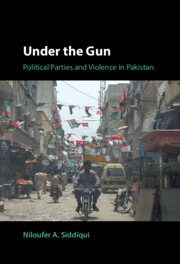Book contents
- Under the Gun
- Under the Gun
- Copyright page
- Dedication
- Contents
- Figures
- Tables
- Acknowledgments
- Abbreviations
- 1 Introduction
- 2 The Logic of Party Violence
- 3 Setting the Stage
- 4 Who Owns the Guns? the Muttahida Qaumi Movement and Violence in Karachi
- 5 The Pakistan Peoples Party and the Gangs of Lyari, Karachi
- 6 Allying with Militants? the Pakistan Muslim League-Nawaz and Sectarian Groups in Punjab
- 7 An Ideology of Nonviolence? the Awami National Party in Khyber Pakhtunkhwa
- 8 Party Violence in Comparative Perspective
- 9 Conclusion
- Appendix
- Bibliography
- Index
6 - Allying with Militants? the Pakistan Muslim League-Nawaz and Sectarian Groups in Punjab
Published online by Cambridge University Press: 18 November 2022
- Under the Gun
- Under the Gun
- Copyright page
- Dedication
- Contents
- Figures
- Tables
- Acknowledgments
- Abbreviations
- 1 Introduction
- 2 The Logic of Party Violence
- 3 Setting the Stage
- 4 Who Owns the Guns? the Muttahida Qaumi Movement and Violence in Karachi
- 5 The Pakistan Peoples Party and the Gangs of Lyari, Karachi
- 6 Allying with Militants? the Pakistan Muslim League-Nawaz and Sectarian Groups in Punjab
- 7 An Ideology of Nonviolence? the Awami National Party in Khyber Pakhtunkhwa
- 8 Party Violence in Comparative Perspective
- 9 Conclusion
- Appendix
- Bibliography
- Index
Summary
Chapter 6 focuses on the electoral alliances that the Pakistan Muslim League-Nawaz (PML-N) forms with violent sectarian actors in Punjab province. Using a combination of extensive fieldwork and data on party organization and electoral candidates, I demonstrate that the PML-N is an organizationally weak party lacking a captive support base in Punjab’s political landscape of shared sovereignty. Because it has limited presence at the local level, the PML-N must rely on pre-existing, influential patrons who manage microlevel clientelistic structures and can function effectively as electoral intermediaries between the party and potential voters. Historically, these patrons have been landed elites. The PML-N has allied with them, often giving them party tickets on which to contest elections, in exchange for their vote bank. In recent years, anti-Shia sectarian actors associated with violent nonstate armed groups have started to challenge the influence of these traditional elites in many electoral arenas. As these violent actors have gained local power, they have replaced traditional elites as patrons and electoral intermediaries for the PML-N. In exchange for their help getting local votes, the PML-N turns a “blind eye” to their violence, resulting in their further entrenchment and empowerment.
Keywords
- Type
- Chapter
- Information
- Under the GunPolitical Parties and Violence in Pakistan, pp. 140 - 172Publisher: Cambridge University PressPrint publication year: 2022



